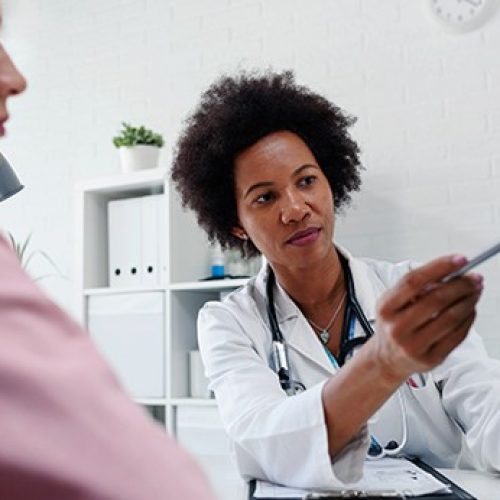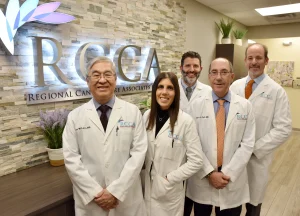
What Is Triple-Negative Breast Cancer?
If you or a loved one has been diagnosed with breast cancer, you might have heard the term “triple-negative” breast cancer. The American Cancer Society
HIPAA Alert: Potential Data Breach Learn More
Questions on Oncology, Hematology and/or Infusion Clinical Services due to COVID-19 Crisis – CALL 833-698-1623
Important Information for Our Patients Regarding the Coronavirus.
RCCA Providing Area Cancer Patients with Access to Care During Coronavirus Outbreak
RCCA Offering Patients Virtual Visits During Coronavirus Pandemic
Patients who have received a diagnosis of testicular cancer can find outstanding care and a variety of treatment options at Regional Cancer Care Associates. Compassionate physicians are also available to provide second opinions on a diagnosis or treatment plan. We offer cutting-edge medical care at multiple convenient locations throughout New Jersey, Connecticut, Maryland, and the Washington, D.C. area.
The testes or testicles are a pair of male glands that produce sperm and hormones, including testosterone. They are found within the scrotum sac that hangs behind and below the penis. Many types and subtypes of cells form the testicles, so there are several types of testicular cancer.
While rare, testicular cancer is the most common form of cancer detected in men between the ages of 15 and 45. Cancer is cell growth that is abnormal and uncontrolled. It can lead to the formation of tumors or masses. These abnormal cells also can spread to the lymph or blood systems, which enables cancer to spread throughout the body. Testicular cancer can develop in one or both testicles.

There are several known risk factors for testicular cancer, including:
It is important to understand, however, that testicular cancer can occur in men and boys of any age, including in those who do not have any of these known risk factors.

If cancer does not spread outside the testicles, patients have a higher chance of survival. The American Cancer Society reports that the five-year relative survival rate for localized testicular cancer is around 99%. However, this number drops to 73% once cancer reaches distant organs.
These statistics highlight the importance of early detection and treatment. Body awareness and self-exams are key to the early detection of testicular cancer. Whether a testicle appears swollen, or a lump is discovered, any symptom should be brought to the attention of a qualified medical professional as soon as possible. Unfortunately, not all testicular cancers cause symptoms.
Some people experience painful testicular cancer symptoms, while others do not have any symptoms. Becoming aware of the common symptoms of testicular cancer can aid in early detection. They include:
Oncologists employ a standardized approach to assess the status – or “stage” — of testicular cancer. This helps guide the clinical categorization of the cancer, as well as to choose the most appropriate treatment regimen. There are four main testicular cancer stages:
Factors including a patient’s age and overall health, the type of testicular cancer, and the stage of cancer help determine the best course of action, which for some patients and types of tumors may entail active surveillance – regular and careful monitoring and testing – rather than immediate treatment. The oncology experts at Regional Cancer Care Associates may recommend one, or a combination of, the following testicular cancer treatments:
In addition to these options, new treatments continue to be evaluated in clinical trials. An emerging treatment option involves stem cell transplantation in conjunction with chemotherapy.
A cancer diagnosis can be very difficult for the patient, as well as for the person’s loved ones. The team at Regional Cancer Care Associates encourages everyone involved to learn more about testicular cancer. There are many resources available from respected organizations, such as the American Cancer Society. Regional Cancer Care Associates also provides support and information. Please talk with a healthcare professional in you need assistance with any of the following:
Patients with testicular cancer can receive outstanding, comprehensive, and advanced treatment at Regional Cancer Care Associates. Patients also benefit from the convenience of obtaining the latest in cancer care close to home. Contact RCCA about care for cancer and blood disorders at one of its 25 locations throughout New Jersey, Connecticut, Maryland, and the Washington, D.C., area.
Regional Cancer Care Associates (RCCA) offers high-quality, comprehensive and advanced treatment close to home. At RCCA, you’ll be treated by experts who are part of one of the largest cancer care networks in the country. We focus on every patient, individually, and work with you and your family to make sure your care is second to none.
For more information, or to schedule an appointment, call (844) 346-7222. You can also schedule an appointment by calling the RCCA location nearest you.

If you or a loved one has been diagnosed with breast cancer, you might have heard the term “triple-negative” breast cancer. The American Cancer Society

Patients receiving treatment from Regional Cancer Care Associates in Moorestown are in good hands. Five of its physicians — Dr. Seth Berk, Dr. Maurice Cairoli, Dr.

A cancer diagnosis can bring a wide range of emotions, from fear and stress to sadness and hope. These feelings are a natural part of
When standard cancer treatments aren’t providing the results you want, clinical trials may offer hope. Our physicians use clinical trials to study new treatments, helping transform cancer care for the better. You can enroll in a clinical trial to try groundbreaking treatment plans at zero cost to you.

Regional Cancer Care Associates is one of fewer than 200 medical practices in the country selected to participate in the Oncology Care Model (OCM); a recent Medicare initiative aimed at improving care coordination and access to and quality of care for Medicare beneficiaries undergoing chemotherapy treatment.